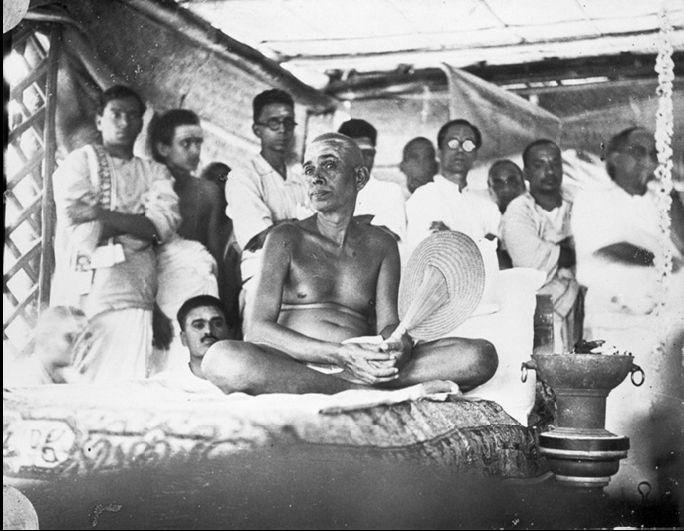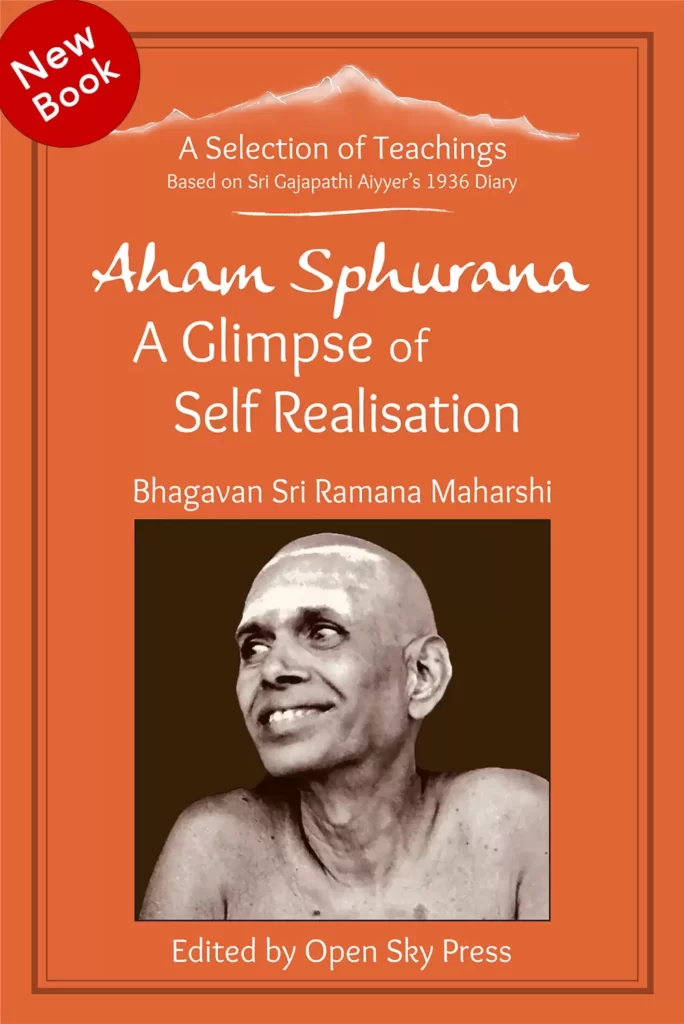
Aham Sphurana
A Glimpse of Self Realisation
New Book about Sri Ramana Maharshi

Available Worldwide
On www.openskypress.com and Amazon:

“In my opinion, Aham Sphurana, a Glimpse of Self Realisation, will become a Treasure Trove of Wisdom to the Seekers of Truth in general, and particularly to the devotees of Bhagavan.”
Swami Hamsananda – Athithi Ashram, Tiruvannamalai
Vichara, Self Enquiry
Major Chadwick Shares
Q.: What are the indicators based on which I shall be enabled to find out for myself whether I am doing vichara [Self enquiry] correctly or not?
B.: If vichara has resulted in a state of mind wherein it abides as identical with pure Subjective Consciousness, then you have done it correctly.
However, it is not easy for the novice to tell whether his mind is presently abiding as identical with pure Subjective Consciousness, because the dull mental state of manolaya [loss of awareness] is often mistakenly regarded as being the tabula-rasa [clean slate] mental state of pure Subjective Consciousness.
When mind abides as identical with pure Subjective Consciousness, it unmistakeably scintillates “I”-“I”. Thus, the definitive answer to your question is that vichara has been done correctly when doing it has resulted in the aham sphurana [Self-realisation] flashing forth.
Q.: And how to recognise the aham sphurana when it “flashes forth”?
B.: There is no possibility of mistaking it when the experience actually occurs. Whatever description is given is not only useless but also counter-productive, because if a description of the experience of aham sphurana is given, the mind twists and contorts the present banal experience of outward-protruding, satiation-craving mental impulses into one that seems to perfectly match with the description given: because it wants to avoid getting destroyed.
So, even if you have heard a description of the experience of the aham sphurana being furnished in this Hall, please make no effort to recollect it. When the aham sphurana actually flashes forth, you will know it alright. Cognition of the aham sphurana is not based on intellectual corroboration. It is a direct experience of the Self, inferior only to the Sahajastithi [natural state] of the Jnani.
Q.: Is the aham sphurana something that is felt only by ripe souls?
B.: Yes.
Q.: What are the others to do then?
B.: [smiling] Ripen themselves!
Q.: How?
B.: Vichara abhyasa [continuous practise] is the way.
Q.: I would now like to ask a slightly different, but related, question. Please tell me how I can find out how much progress I am making with respect to the vichara abhyasa.
B.: The length of time for which you are able to keep the mind in a state wherein it abides as identical with pure Subjective Consciousness is the yardstick by which you can find out how efficaciously you are practising vichara.
However, more pragmatically, the degree of the absence of both thought [imagining this and that] and mental dullness is the means to measure progress. However, the desire to progress is an obstacle — get rid of it. Ask yourself who it is that wants to measure progress.
Chadwick: [unhappily] I have been staying here for months. I see no improvement in me. If anything, my condition seems to be taking a turn for the worse. The viscosity of my thoughts is on the wax. I am consistently using Bhagavan’s vichara method.
Yet there is no diminution in the strength of the army of thought that I am attacked by day after day. I am desperate to Realise in this lifetime. Or, if I am born again, Bhagavan must also agree to be born again to help me Realise in the next life. Without Bhagavan what can I do?
Someone from the back of the Hall called out: “He is a Jivan-muktha [liberated being]. Where is the possibility of further birth for Him? Is not the suggestion absurd?” Chadwick merely ignored him.
B.: Give up the idea that you are striving for Realisation.
Ch.: [Aghast] What?! Bhagavan would have me abandon the quest? Has he decided I am unworthy to Realise?
B.: Did you pay attention to what was said to you? You were not asked to abandon the quest. You were asked to abandon the spurious idea that there is a “you” which is trying to merge with a “super-you”.
Ch.: [gloomily] I understand nothing.
B.: Throw away the belief in the existence of the personal self. It is only on that erroneous basis that you are now asking questions.
Ch.: But I must remain to perform sadhana [practise]!
B.: What is the objective of sadhana?
Ch.: Destruction of the ego.
B.: No, transcendence of the idea of its existence.
Ch.: So, if I just free myself from the idea that I exist as an individual person, the Who am I? method is not needed?
B.: First discard that erroneous idea. Having discarded that idea, do not bring in any other idea in its place, such as Aham Brahmasmi, [I am being-consciousness], etc. Remain free from all ideas, that is, from all mental identification. Let the mind remain in the state of pure Subjective Consciousness free from all objectification or identification.
Then, as and when thoughts arise, tackle them with the counter thought, “To whom has this thought arisen?” This arrests the further development of the thought. Then return the mind to its native state of pure Subjective Consciousness. This is the way.
Ch.: Bhagavan has been quoted as saying that certain qualifications are necessary for those intending to successfully pursue vichara. Will Bhagavan please explain those qualifications?
B.: It is enough to intuitively recognise that the three states are passing phenomena not having any reality. But again, consequent to steadfast and unintermittent practise of vichara, such intuition dawns unbidden. So, there is really no need, prior to commencing practice, to sit down and endlessly reflect whether you are competent enough to pursue the practise so as to result in the outcome of success. If you find that it attracts you, you can certainly go on to practising vichara.
Q.: Before taking up vichara, is it necessary to first qualify myself or prepare myself using preliminary practices such as breathing techniques, visualisations of pleasant mental imagery, etc.? Or can I plunge into vichara straightaway?
B.: The best preparation for vichara is vichara. The other practices are for those to whom vichara—for some reason—does not appeal favourably.
Q.: I am a man who is utterly new to spiritual practice. Should I begin with vichara? Or should I begin with an easier method, such as watching the breath, for instance, and move on to vichara once my mind has acquired sufficient maturity?
B.: No method is per se easy or difficult. Depending upon one’s temperament, what one finds easy the next man finds difficult. The thing to do is to stick to what fascinates you. Never mind which method is best. Which method appeals to you?
Q.: I like to meditate, however Bhagavan has opined that vichara is the only means to pierce the veil of ignorance. So, I tend to castigate myself that I am following a method, which, according to Bhagavan does not lead me to Realisation.
B.: Who said that I disapprove of other methods? You may go on following your present method until you yourself feel, intuitively rather than intellectually, that the time has come for you to give up the sadhana [practise]. At that point in time the mind will automatically begin to gravitate towards incessantly reflecting upon “I”.
Fascination with “I” leads to spontaneous vichara. Vichara, if not done for its own sake, does not bring forth a successful result. If a splinter of wood is stuck in your gum, your tongue will of its own accord go on trying to uproot it, without the need for any conscious effort on your part.
Vichara will succeed only when there is that degree of spontaneity. The tongue knows that the splinter is a foreign body and must go. It will go on fighting until the alien appendage comes loose. Likewise, the mind must be able naturally to discern the ego, to which it owes its apparent existence, as being an unnatural and alien entity.
This astuteness will come only after prolonged practice. That abhyasa may take up any form which appeals to you. Whatever road you are pursuing now will of its own accord lead you to vichara when the moment is ripe, provided you are sincere and unrelenting in your effort.
Q.: When thoughts occur, I should revert my attention back to pure Subjective Consciousness. That is the point of vichara. Is that right?
B.: What you mention is without doubt vichara. But there is more to it [vichara].
Q.: Please explain.
B.: Once the practise of vichara has brought about a sufficient degree of ripeness [maturity or steadiness in introversion], the mind is loathe to think thoughts and is now content to remain merged in the Beingness of the Self.
Even then, however, there is the suble “I” who spectates the fact of the mind remaining so merged. Catch hold of him and incessantly scrutinise him–and when he vanishes, Jnana alone remains.
Q.: I have been investigating “Who am I?” for several years. I see no result. What is the reason? Where am I going wrong? What am I doing wrong? Please help me.
B.: What is meant by vichara? Is it to intellectually analyse oneself along the lines of the question, “Who am I?”
Q.: Isn’t that it?
B.: No. Vichara means effort to trace thought back to its source, culmination of which effort is discovery of such source as being the Shining of the self-resplendent Heart that is, the Beingness of the Self. The penultimate triumph in vichara has come about when effort is needed in order to leave the Shining of the Heart rather than in order to plunge and merge into It.
If you incessantly hold on to the source of thought, there will come a time when emergence from such source becomes altogether impossible; the embodiment of this state is what vichara sadhana seeks to achieve. Vichara means hunting for the source of thought so that we might abide exclusively and permanently there as and there in. To practise vichara is simply this: seek whence within yourself it is that thought arises; having found such source, stay there once and for all.
Q.: Some practice vichara for a short while and succeed in Realising. Others try for decades; their efforts are rewarded only with failure. What is the explanation?
B.: What matters is extent of intensity of introversion of mind. There must be desperation to Realise the Self. The thirst to discover Reality, the yearning, the longing must burn brightly in the mind, burn with enough force to reduce the mind into ashes. Half-baked and half-hearted efforts are not going to get you anywhere.
Once you know that all this is fiction, can you remain content until and unless Reality is gained? The more actually unacceptable the mundane existence is, as opposed to the mere intellectual understanding or conceptual notion that existence in the form of the body is undesirable to you, the greater your chances are of Realising the Absolute Existence. Perfection in vairagyam [renunciation], automatically brings about Jnana in its wake.
Edited by John David Oct 2021







